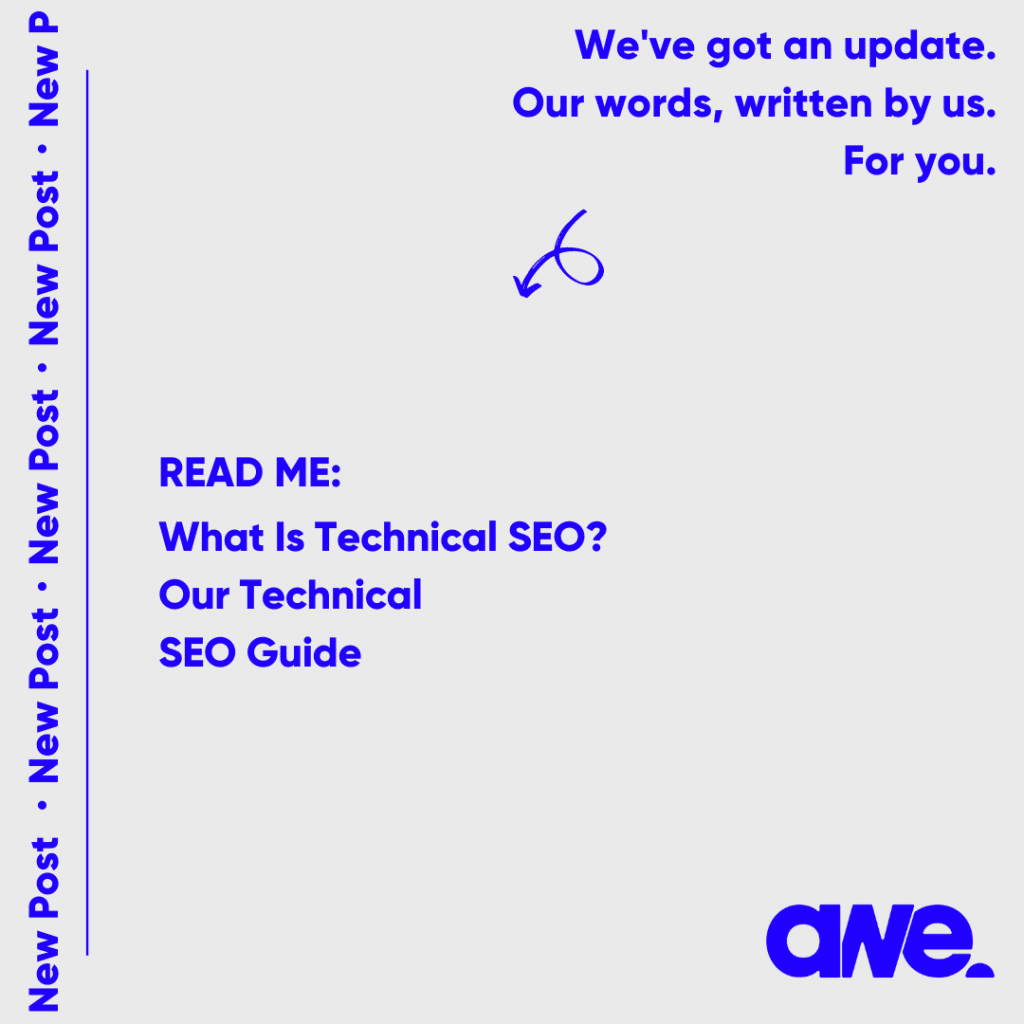
Technical SEO (Search Engine Optimisation) refers to the technical aspects of your website’s search engine optimisation efforts. There are a number of key technical components that go into a well structured SEO campaign, and they should never be skipped.
As part of our recent content series, we have covered exactly what on-page SEO is, what off-page SEO is and now we’re demystifying technical SEO.
While technical SEO is one of the more specialist aspects of a SEO strategy and can be difficult to wrap your head around, technical SEO is absolutely critical for search engines to properly index and read your website.
When forming a SEO strategy, it is imperative to ensure your technical SEO is up to scratch and contains the right structured data for search engine crawlers to read properly. Without having your technical SEO in place, every other aspect of your SEO campaign crumbles.
With that said, let’s jump into our guide to technical SEO for business owners.
Technical SEO Explained
Technical SEO refers to the technical aspects of your website and the technical aspects of your overall search engine optimisation campaign.
Sounds complex, right?
Well, it doesn’t have to be. Technical is quite different to on-page SEO, where you are actively working to ensure the information on your website matches search intent and is very different to off-page SEO, where you are ensuring your website is receiving press across search engines.
Technical SEO refers to everything else that is in-between these two different SEO variables. Often thought as the more specialist element of SEO, technical SEO is the overall technical optimisation of your website, your website’s structure and its hosting (or living) environment.
Key Components of Technical SEO
There are a large number of aspects to technical optimisation, or technical SEO, and we’re going to cover off some of the most critical technical SEO components here.
Everything from ensuring your website is structured properly to allow search engine spiders to read your website, right through to crawl errors and mobile responsiveness.
This technical SEO guide is in no way a complete A-Z of every technical SEO aspect, as there are hundreds, however these are the main technical SEO aspects that we focus on here at Australian Web Experts across our client SEO campaigns.
Site Structure
The structure of your website, or site structure, is incredibly important. In essence, your site structure will not only determine how users and visitors interact with your website, but it will also determine how search engines crawl and read your website.
By ensuring that you have a proper site structure plan in place, search engines will understand your content better and rank your content appropriately within the Google search results.
Without a cohesive site structure in place, you are unable to link relevant pages and/or content together, and do not encourage search engines to read your information properly.
Website structure is often not considered when planning your overall site’s architecture, however it is one of the technical SEO fundamentals that needs to be followed properly to maximise your websites search results.
URL Structure
As part of your SEO strategy, you have likely undertaken a keyword research plan. As part of this keyword research plan, you have likely identified target keywords that you’d like to rank within the organic search results for.
When producing content or creating web pages to target these specific keywords, it is important that your page’s URL matches your keyword intent. This is where URL structure comes into play.
In short, this is the basics of URL structure. By ensuring you are considering your URL structure when auditing your website and creating new content, you can determine the best website URL for each page.
It is best practice to ensure your URL structure matches your desired search terms, or keywords, in a natural way.
Schema Markup & Structured Data
Schema markup is a form of micro-data (or structured data) that allows you to add enhanced descriptions, often referred to as rich snippets, to your search engine results.
With schema markup, you can add structured data such as reviews from third parties, images and other relevant rich snippets. This structured data allows your website to stand out within search engine results, and provides your website traffic with relevant information about your business.
Adding structured data can be complex, however for businesses who are focusing on their technical SEO, it is critical to ensure you add structured data for relevant web pages.
Website Hosting
Website hosting is often forgotten about when it comes to technical SEO, however it can have a giant impact on the overall speed and function – making it a key player in your website’s technical SEO.
Since we are an Australian digital marketing agency, servicing Australian clients, we always ensure our clients are hosted locally. By hosting your website within your geographical location, your website will load faster and be more relevant for local search results.
Website Security & HTTPS
A SSL certificate that creates an encrypted connection between your website and your website users is paramount not only for website security, but also for technical SEO.
In 2016, Google announced that it would begin tracking the adoption of HTTPS and SSL certificates and it has become the gold standard of website encryption ever since.
If your website is not showing as Secure, with a HTTPS/ SSL certificate, it is important to include this as part of your technical SEO strategy.
Websites without this level of security protocol are typically not trusted by users since they are deemed unsafe, and are therefore not favoured within the search engine results.
Google Search Console
While the set-up and integration of Google Search Console is relatively easy and straightforward, most users don’t understand how to analyse the data within Google Search Console properly.
As part of every SEO package that Australian Web Experts is engaged for, we manage and analyse the data sets provided by Google Search Console to pinpoint technical SEO components that need to be resolved and/or optimised.
There are a bunch of quality resources across the web that outline best practices for search console, however it is always best to use a technical SEO expert to analyse this complex search console data properly.
Internal Linking Structure
In order for search engines to read the information across your web page, or website, you need internal links.
Not only do internal links allow website users to navigate between topical pieces of content, internal links also allow search engines to do the same.
By creating internal links that link between different pieces of content, you are able to tie different pieces of content together and show search engines the relevance of this content.
Internal linking is paramount, as has been shown by recent algorithm updates, and you need to make sure you are building internal links between relevant pieces of content.
Broken Links
Broken links can occur for a number of different reasons. They can be a result of internal links pointing to now defunct pages, or they can be a result of off-page link building that now point to defunct pages.
It doesn’t matter what link building strategies have been used or why these dead links are there, they need to be resolved. Search engine crawlers are not able to follow broken links, and they can harm your website.
As part of our SEO campaigns, we ensure that all broken and/or dead links are rectified to maximise crawl-ability and rankings within the search results.
Website Speed
While local website hosting will certainly assist with website speed, since your website users will typically be finding your website within the local organic search results in your geographical region, there is more that can be done to improve your site speed.
Site speed, and overall page speed, are integral for technical SEO. When a website user loads a website page, they expect the page to load within a short period of time.
If your website’s page speed isn’t up to scratch, websites can receive higher bounce rates which will harm your overall SEO and relevance in the organic search positions.
To increase page speed across your web pages, we always recommend looking into caching solutions and other website speed optimisations. To analyse your website’s speed and score, you can use this popular website speed tool.
Crawl Errors
A large component of your technical SEO efforts with Australian Web Experts will go into crawl errors.
Crawling and indexing issues are typically outlined in Google’s search console, and can present a number of issues for search engines or even block search engines from accessing them. If web pages are unable to be crawled, search engines effectively cannot see these pages or the content on the page.
There are a variety of reasons that could cause these crawl errors for search engines, and this is where you need a technical SEO professional to identify and resolve these technical SEO issues.
Indexing Web Pages
Any technical SEO strategy will focus on ensuring every website page is indexed. Similar to crawl errors, if a particular web page isn’t indexed – search engines cannot see or read this web page.
While we never recommend using technical SEO tools that force index web pages, as this goes against Google’s guidelines – there are a number of best practices to ensure each website page is indexed appropriately within the search engine.
Mobile Responsiveness
Mobile friendliness and responsiveness is huge for technical SEO. With mobile users representing a large portion of website users, you need to ensure your website is mobile friendly.
For most newly built websites, your website may already have a level of mobile friendliness, however this needs to be checked across all website pages.
Even if you believe your website is mobile friendly, some elements simply will not work across mobile and desktop versions, so you need to ensure you are checking each page individually.
Technical SEO will focus on ensuring each page of your website works across all devices, and is mobile friendly. From time to time, your website may require a mobile site built to ensure it complies with technical SEO.
Duplicate Content
While some may think duplicate content relates to on page SEO, it is actually a critical component for technical SEO as well.
Duplicate content is not favoured by search engines and should be avoided at all costs. It has long been a practice for some SEO companies to simply duplicate content for their clients, usually across location landing pages, however this is not favoured by search engines anymore.
A well executed technical SEO campaign will remove duplicate content and any content that is the same across all pages. Your overall site’s content and on page SEO is important for technical optimisation.
Sitemaps
A sitemap, or XML sitemap, is integral for search engine crawlers to read your website. Search engines require an XML sitemap to understand what is occurring on your website, and the pages that make up your website.
From a technical SEO standpoint, an XML sitemap needs to be configured in a lightweight way to ensure search engines are crawling and indexing your website on a regular basis.
An XML sitemap can also be added to your Google search console to ensure Google crawlers check your website and index it accordingly.
Is Technical SEO Important?
Technical SEO is one of the most important parts of SEO. Search engines cannot read or index websites if their technical optimisation is not completed properly, or if their website is presenting technical issues.
Without a proper technical SEO strategy in place, a website cannot rank effectively within Google or other search engines. It doesn’t matter if you are a small local business or a large enterprise, technical SEO is incredibly important to adhere to.
By performing technical SEO on your own website, you are telling search engines that your website is relevant for your ideal search queries. Technical SEO goes beyond SEO basics and is fundamental for any business who wants to rank online.
How Much Does Technical SEO Cost?
The best way to ascertain how much technical SEO will cost is to get a technical SEO audit, the second best way is to refer to our SEO costs resource.
Since we are a full service SEO agency, we include technical SEO as part of all of our SEO packages and SEO campaigns, however some agencies do charge additionally for technical SEO.
Since proper technical SEO requires a technical specialist, it can sometimes be costly. If you are considering getting a technical SEO audit, or undertaking technical SEO, we recommend working with an agency that includes technical SEO as part of their SEO packages to reduce the overall cost of your technical SEO.
How Long Does Technical SEO Take?
Technical SEO goes hand-in-hand with your overall SEO strategy, and is usually an ongoing process that takes time. If there are key issues at play, such as duplicate content or structured data issues, these can usually be resolved relatively quickly.
As with all things SEO, the timeframe it takes to undertake technical on your website will depend on various factors. Technical SEO is something that should be worked on a monthly basis, since various algorithm and website changes will inevitably occur.
Any good SEO agency offering SEO services will usually have a technical SEO specialist that will work on your website’s technical SEO each and every month.
Work With An SEO Agency That Understands Technical SEO
Hopefully we have been able to give you some important information on everything technical SEO. As Australia’s leading SEO agency, we understand that technical SEO can get complex.
This is why our clients love our SEO packages that include all aspects of a business’s SEO. Our SEO packages offer a complete approach to your SEO efforts, and comprise of on-page, off-page and technical SEO.
If you’d like a technical SEO audit, or would like to chat about SEO for your business, please reach out! We love helping business owners succeed online through digital marketing.




